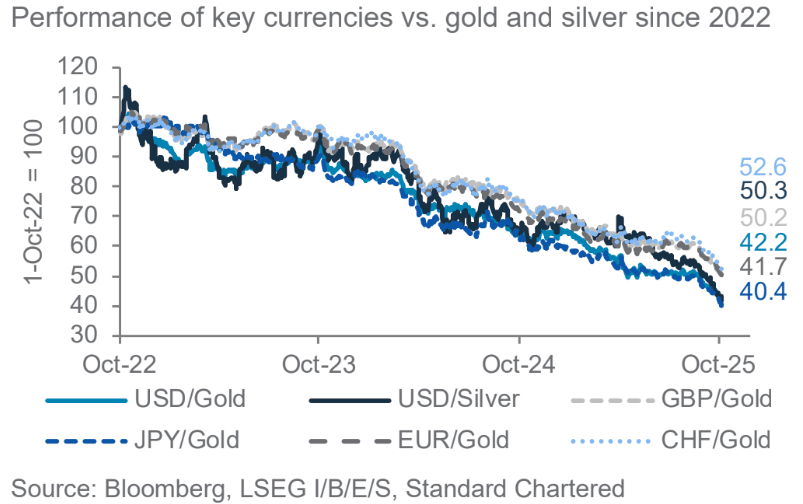
Image © Adobe Stock
The loss of real value in major fiat currencies is a key theme our readers should be aware of.
Surging gold and silver prices reflect concerns that world governments are devaluing their fiat currencies with inflationary fiscal policies, suggests a new research note.
Analysts at Standard Chartered, one of the UK's biggest listed banks, say "all is not well with the world’s leading currencies."
"The surge in gold and silver over the past three years is essentially a devaluation of the world’s fiat currencies," they warn in a new weekly research note.
The silver and gold rallies have accelerated in recent weeks, with gold crossing USD 4,000/oz for the first time.
Standard Chartered explains this reflects renewed concerns about fiat currencies due to the increasing dominance of fiscal policy across Developed Markets.
Currency debasement refers to the loss of real value in major fiat currencies, not because of any change in their nominal exchange rates against one another, but because they've fallen in value relative to hard assets like gold and silver.
When governments raise expenditures at a faster rate than an economy's output, prices in the economy tend to rise. This inflation tends to reduce the value of the domestic currency relative to 'hard' assets that cannot be inflated, such as gold.
"The primary concern is governments worldwide are increasingly relying on fiscal policy to stimulate and sustain growth, raising the risk of a return to the inflationary 1970s," says Standard Chartered.
A case in point is today's UK labour market data, which shows public sector wages grew at 6.0% in the year to August, outstripping private sector pay.
This government-funded rise in wages is considered inflationary by economists as wages drive demand in the economy.
At the same time, the Bank of England is engaged in an interest rate cutting cycle, which adds an additional demand impulse that further stimulates inflation.
"While the JPY and USD have devalued the most among the majors, other currencies such as the EUR, GBP and CHF are not too
far behind," says Standard Chartered.


